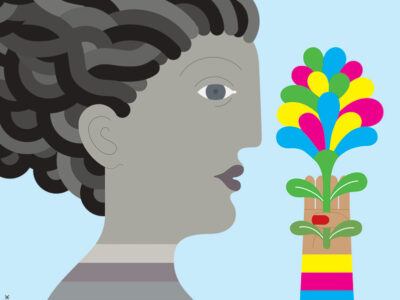MOST SCHOOLS IN INDIA don’t teach about sex, let alone AIDS, because they’re considered taboo subjects. But that hasn’t stopped the development of more than seven million cases of HIV in the country. Troubled by the statistics, Shilpa Rao, C’98, spent the past summer volunteering as an AIDS educator in Bombay for VISIONS Worldwide, a non-profit group run by college students from the United States. The organization sends delegations of volunteers to conduct AIDS-awareness workshops at schools, colleges, and community centers throughout the country while also training Indian citizens to work as peer counselors.
“The biggest problem there is that most people don’t even know how it’s transmitted or how they get it, let alone how to protect themselves,” Rao says. “We go in and talk about the forms of transmission — the biology — but also the social issues that are intertwined with it, such as discrimination.” Some Indian doctors and nurses, for instance, have refused to treat AIDS patients, she says. Visiting hospitals while researching local health resources, her group learned of one patient who had vomited on himself and didn’t get his sheets cleaned for a week because the staff was afraid of catching AIDS.
Rao was surprised at the strong resistance her group encountered from some school authorities. “Before we could do a presentation at a school, we had to go talk to the principal to get permission. Lots of times the schools were like, ‘No, no, no, we don’t need this.’ Even some colleges would say, ‘We understand that college students are having sex, but ours aren’t.'” When they were permitted to address a group, they occasionally had to censor their presentations. “I’ve had teachers stop us in the middle of [condom demonstrations], saying we can’t do that.”
Although Indian train stations may be covered with posters warning about AIDS, awareness and education are often two different things, Rao soon learned. One of the most common questions she was asked, for instance, was whether the development of the impotence drug, Viagra, would increase HIV cases. At first she was puzzled, but then when she considered how little the students knew about AIDS, it made sense: “What they know about it is one, that there is no cure for it, and two, you get it from sex. They don’t distinguish between protected sex and unprotected sex, and they don’t distinguish between lots of sex with one partner and the fact that with multiple partners, there is an increased likelihood … They think if you have sex at all, you’re going to get HIV. That’s what’s been drilled into their heads by their parents.”
Rao, who majored in biological basis of behavior and competed on Penn’s gymnastics team, is taking time off this year to apply to medical schools and work with local AIDS organizations. Next summer she plans to return to India to lead a delegation of peer educators.
Sunday, July 6, 2025
Popular
Administration
Anniversary
Archaeology
Architecture
Art
Awards
Books
Calendar
Campus Life
Commencement
Education
Elsewhere
entrepreneurs
Events
Exhibition
Expert Opinion
Faculty
Film
Football
Gifts
Health
Healthcare
Heard on Campus
History
International
Leadership
Medicine
Men's Basketball
Music
notes
obits
painting
Penn Medicine
Penn Museum
Philadelphia
Photography
Poetry
Politics
Science
Student Life
Technology
Television
Theater
Wharton
Window




